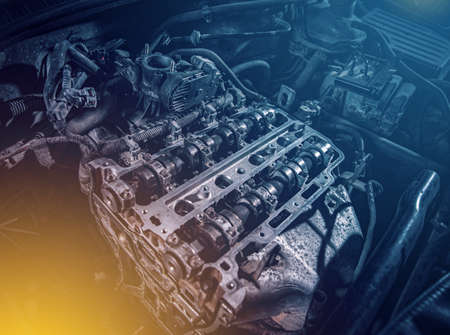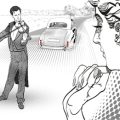1. Introduction: The BTCC Phenomenon
The British Touring Car Championship, affectionately known as the BTCC, stands as one of the United Kingdom’s most iconic motorsport spectacles. Rooted in a tradition that dates back to 1958, the BTCC has evolved from humble beginnings into a cherished pillar of British automotive culture. Unlike other racing series which often remain distant or exclusive, the BTCC is woven tightly into the fabric of everyday motoring life, bridging the gap between professional racing and the average UK driver. Its enduring appeal lies not only in its thrilling on-track battles but also in its celebration of cars that are familiar to British roads and households. As we explore the influence of the BTCC, it is essential to appreciate its origins and understand how it has become more than just a championship—serving as an emblem of national pride and inspiring generations of car enthusiasts across the country.
2. BTCC and Its Impact on UK Automotive Brands
The British Touring Car Championship (BTCC) has long been a proving ground for the nation’s most cherished automotive names, shaping both their reputations and their engineering philosophies. From the golden era of Austin and Ford to the modern dominance of BMW and Honda, BTCC’s influence stretches far beyond the chequered flag, deeply embedding itself in the very fabric of British motoring culture.
Prestige Forged on the Track
Success in the BTCC brings more than trophies; it confers a sense of prestige that resonates with both enthusiasts and everyday drivers. Classic marques such as Jaguar, Rover, and Vauxhall have seen their public image elevated through legendary victories and spirited rivalries. The phrase “race on Sunday, sell on Monday” rings especially true in Britain, where showroom sales often mirror results at iconic circuits like Brands Hatch and Silverstone.
Engineering Focus: From Pit Lane to Public Road
BTCC regulations demand innovation within strict boundaries—sparking a tradition of clever engineering that filters directly into road cars. Turbocharging, advanced suspension setups, and lightweight materials, once reserved for racing, have become hallmarks of mainstream British vehicles. The relentless pursuit of reliability and performance in motorsport has driven automakers to refine their production models, ensuring that every family saloon or hot hatch carries a hint of racing pedigree.
Key British Automotive Brands and Their BTCC Influence
| Brand | Classic Era | Modern Era | Notable Achievements |
|---|---|---|---|
| Vauxhall | Cavalier, Astra | Astra, Insignia | Multiple constructors’ titles; household recognition |
| Ford | Sierra Cosworth | Focus ST/RS | Cult following; technological innovation transfer |
| BMW | – | 3 Series, 1 Series | Modern championship wins; premium brand perception strengthened |
| Honda | Civic (late classic) | Civic Type R | Engineering excellence spotlighted; youth market appeal bolstered |
| Nissan | Primera (90s) | – | Pioneered electronics; inspired enthusiast modifications |
An Enduring Legacy for British Icons
The impact of BTCC is not merely historical but ongoing—continuously shaping how manufacturers present themselves to the world. Today’s advertisements still echo the language of competition: agility, resilience, innovation. Whether you’re behind the wheel of a humble hatchback or a celebrated performance model, there’s an undeniable thread connecting your car to Britain’s racetrack legends—a testament to the enduring power of BTCC in defining national automotive identity.

3. Influence on Car Modifications and Tuning Culture
BTCC’s impact stretches far beyond the racetrack, weaving itself into the very fabric of British car culture. The championship has long served as a living laboratory, where technological advancements and daring aesthetics are put to the test before trickling down to everyday enthusiasts. From turbocharged engines to bespoke suspension setups, innovations pioneered in BTCC garages have inspired a generation of UK drivers eager to infuse their own vehicles with a touch of motorsport pedigree.
The influence is particularly evident in Britain’s thriving modding scene—a unique blend of ingenuity, nostalgia, and performance obsession. For many, modifying a car is not just a pastime but an expression of identity rooted in the proud tradition of British engineering excellence. The popularity of replica body kits, racing stripes, and alloy wheels owes much to iconic BTCC liveries and aggressive aerodynamic upgrades first seen roaring around circuits like Brands Hatch and Silverstone.
This cross-pollination between the pit lane and public roads extends even to tuning culture. Performance chips, exhaust enhancements, and lowered suspensions are now commonplace among enthusiasts who seek to capture some of the BTCC spirit in their daily drives. The pursuit is not merely about speed; it is about creating a machine that pays homage to the legends of British touring car racing while standing out on the streets of Leeds or London.
Moreover, the accessibility of BTCC—where recognisable family cars are transformed into track weapons—has made performance modifications feel both aspirational and attainable for the average motorist. This distinctive blend of inspiration and practicality has shaped a uniquely British approach to car ownership: one that celebrates innovation, individuality, and a deep-seated love for competition.
4. Shaping Consumer Preferences and Aspirations
The British Touring Car Championship (BTCC) has long been more than a motorsport spectacle—it is a cultural touchstone that has subtly yet powerfully shaped the aspirations of UK car buyers. The roar of engines at Brands Hatch and Silverstone reverberates far beyond the track, inspiring generations to look for more than just utility in their vehicles. Instead, the average motorist now seeks a slice of motorsport excitement in everyday life, fuelling the rise of sporty trims, performance models, and bespoke customisations.
BTCC’s Role in Mainstreaming Sporty Trims
One can trace the growing demand for factory-fitted spoilers, racing stripes, and low-slung body kits directly to BTCC’s popularity. When family saloons like the Ford Mondeo or Vauxhall Astra are seen duelling on television with aggressive styling and enhanced aerodynamics, it is little wonder that their road-going counterparts soon mirror these features on dealer forecourts across Britain. Manufacturers have responded to this cultural appetite by launching “hot” versions of mainstream models—think Ford Focus ST-Line or Vauxhall Astra GSi—allowing everyday drivers to feel connected to the championship’s thrilling legacy.
The Allure of Performance Models
The BTCC’s influence also extends to driving up interest in high-performance variants. Performance badges such as “RS,” “Type R,” or “Cupra” have become household names, signifying not only extra horsepower but also an attitude—a nod to the racing heroes who wear similar insignia on Sundays. These variants are not just about speed; they are about embodying the spirit of competition and technological innovation that defines BTCC.
Popularity of Road-Ready Customisations
Perhaps most striking is how BTCC culture has normalised modifications once considered niche. Alloy wheels, uprated suspension, bespoke exhausts, and even roll cages have found their way onto British roads. Local garages and tuning specialists thrive, offering services inspired by pit-lane ingenuity. The desire for individuality and performance—rooted in racing culture—has become an integral part of UK automotive identity.
Key Trends Influenced by BTCC
| Trend | Description | Popular Examples |
|---|---|---|
| Sporty Trims | Factory styling upgrades mimicking race cars | Ford ST-Line, Vauxhall GSi, BMW M Sport |
| Performance Models | Enhanced powertrains and handling packages | Honda Civic Type R, Seat Leon Cupra, VW Golf GTI |
| Custom Modifications | Tuning and personalisation inspired by BTCC technology | Bespoke alloys, sports exhausts, remapping services |
The British Touring Car Championship has indelibly shaped what Britons expect from their cars: not mere transport, but an expression of ambition and style. Today’s automotive landscape owes much to the enduring allure of BTCC, where every commute can feel like a lap around Donington Park.
5. BTCC in British Popular Culture
The British Touring Car Championship (BTCC) is far more than a showcase of automotive prowess; it has cemented its place as an enduring icon within the fabric of British popular culture. From its roaring engines to its nail-biting finishes, the BTCC has been a source of inspiration for filmmakers, television producers, and storytellers seeking to capture the essence of British motoring passion.
BTCC on Screen: Films and Television
The championships high-octane drama has made frequent appearances on screen, both directly and as an influence. Documentaries and sports broadcasts have long chronicled the rivalry and camaraderie that define the BTCC paddock, while fictional works have often drawn upon the spirit of touring car racing to depict everything from gritty underdog stories to the thrill of mechanical ingenuity. Classic TV series such as “Top Gear” regularly reference the BTCC, using its drivers and cars to demonstrate quintessentially British values like resilience, wit, and competitive edge. The championship’s visual spectacle—colourful liveries, close-quarters racing, and passionate fans—has become a shorthand for excitement in UK-based automotive storytelling.
A Badge of Authenticity in British Motoring
BTCC’s presence in popular culture extends beyond direct representation; it has become a touchstone for authenticity in branding and advertising. Car manufacturers proudly tout their involvement with the BTCC, leveraging its reputation for technical innovation and sporting excellence. This association lends credibility to new models launched in the UK market, especially those styled after touring car icons or equipped with performance modifications inspired by the championship’s technology. As a result, BTCC is not just sport—it’s a stamp of approval recognised by enthusiasts across Britain.
Community and Identity: The Heartbeat of British Motoring
Perhaps most importantly, BTCC’s impact is felt at the grassroots level, where fans gather at circuits or around television sets each race weekend. It has shaped national identity through shared rituals—be it cheering for local heroes or discussing legendary rivalries over a pint at the pub. The language, imagery, and narratives born out of BTCC have seeped into everyday life, making it an integral part of how Britons talk about cars and motorsport. This deep connection ensures that BTCC remains woven into the collective memory of British car culture, influencing how people modify their vehicles and express their automotive passions.
6. Future Trends: BTCC and the Evolution of UK Car Culture
The British Touring Car Championship (BTCC) stands as a harbinger of innovation, continuously shaping the landscape of UK automotive culture. As the championship evolves, it not only mirrors but actively influences broader trends within the nations car scene, especially in an era where sustainability, technological advancement, and youth engagement are at the forefront.
Innovation Driving Sustainable Racing
BTCC’s recent embrace of hybrid technology signals a bold step towards greener motorsport. By integrating hybrid powertrains, the series sets a benchmark for eco-conscious racing, inspiring manufacturers and enthusiasts to adopt sustainable solutions without compromising performance. This commitment echoes throughout the UK market, with road cars increasingly drawing from BTCC’s innovations—think energy recovery systems and lightweight construction—ushering in a new age of responsible yet exhilarating motoring.
Technology Transfer: From Track to Tarmac
The championship has long been a proving ground for cutting-edge developments. Today, advanced telemetry, data analytics, and materials science honed on BTCC circuits swiftly migrate to British showrooms and garages. Drivers and modifiers alike benefit from this synergy; aftermarket parts and tuning philosophies now reflect professional-grade engineering, blurring the line between race car and daily driver. Such cross-pollination invigorates both industries, reinforcing the UKs reputation for ingenuity.
Nurturing Tomorrow’s Car Enthusiasts
Perhaps most compelling is BTCC’s role in cultivating passion among emerging generations. Grassroots programmes tied to the championship encourage young talent to engage with automotive engineering and motorsport culture. As digital natives seek authentic experiences, BTCC offers an accessible entry point—through esports competitions, interactive fan zones, and educational outreach—that ensures car culture remains vibrant and inclusive across Britain.
Looking ahead, BTCC will undoubtedly remain a crucible for progress—balancing heritage with forward-thinking initiatives. Whether through sustainable practices or fostering a community of innovators, the championship continues to inspire all who cherish British motoring excellence. As we anticipate the next chapter in UK car culture, one thing is certain: BTCC’s influence will steer both the market and its enthusiasts toward a future where tradition meets transformation.


